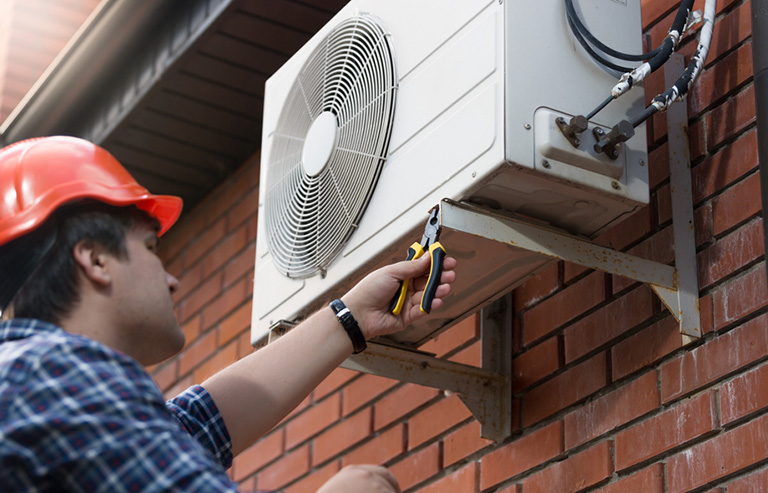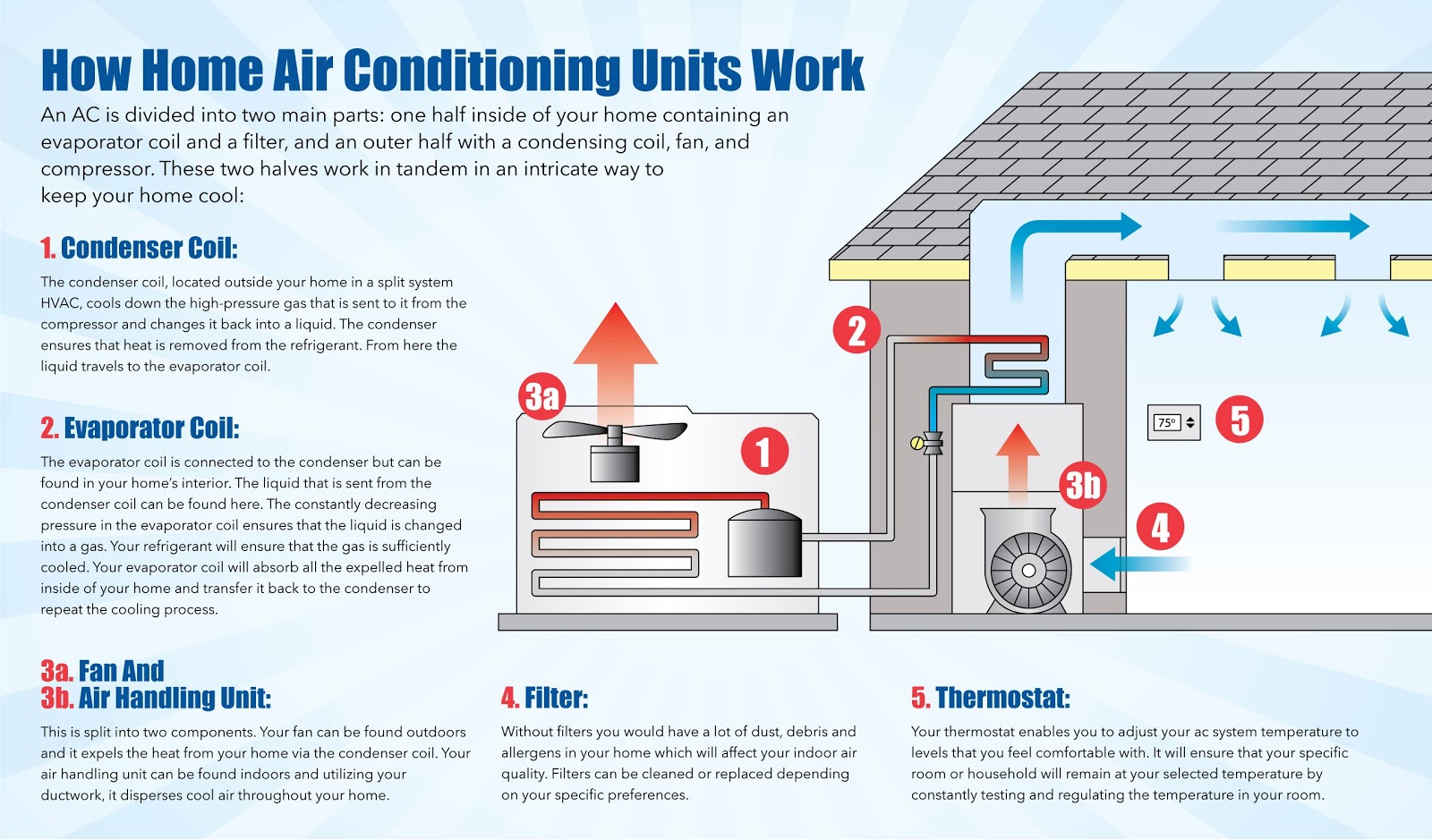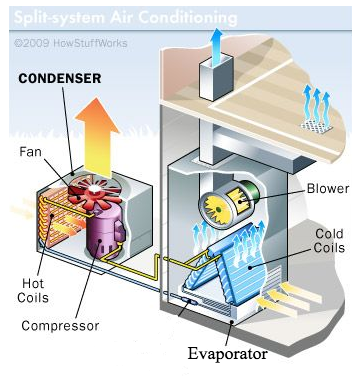Important Troubleshooting Tips for Your AC Compressor

Did you know that around 87% of households in the USA use air conditioning systems? If that number doesn’t explain how much we love our air conditioners then let me give you another data. According to a report issued by the International Energy Agency, the number of air conditioners around the world is approximately 1.6 billion and by 2050, this is expected to surge up to 5.6 billion!
Even though we have an indispensable attachment to the air conditioning system, we have very little idea about how the air conditioning system works or do air conditioners use gas. In this article, we are going to explain in easy terms how air conditions work and everything to know about home AC compressors, and we will also give you effective AC troubleshooting tips.
How Air Conditioners Work
Many people think that air conditioning technology is primarily about cooling the air. But scientifically it is more about removing the heat from your house or target space. Air conditioning system works on the heat transferring mechanism. To understand better, let us look at the major components of an AC. Every AC has two major parts – the Evaporator Unit and the Condenser Unit. In the central air conditioning systems and split air conditioners, these two units come separately. The evaporator unit, often referred to as the inside unit, is placed inside the house. On the other hand, the condenser unit is referred to as the outside unit remains outside of the house. In Window ac, Through-the-Wall AC or other forms of Ac, the evaporator and the condenser units are kept together in one casing. Whether these two units remain together or separately, they control the whole air conditioning process with the help of refrigerant – a chemical fluid known as Freon.

The Evaporator Unit
The evaporator unit consists of a coil, which facilitates the refrigerant to evaporate into gas form so that it can absorb heat from the room. This process is comparable to the water boiling system. To cook or boil anything, we put water on the stove. The water absorbs the heat from the stove and begins to evaporate as a result. In a very similar way, the refrigerant absorbs the heat from our room and turns into the gas form inside the evaporator coil. The evaporator coil is also responsible for transferring the heated gas to the condenser for maintaining the air conditioning cycle.
The Condenser Unit
The condenser unit, often called the outside unit, is responsible for dissipating the heat, which is absorbed by the refrigerant through the evaporator coil. The condenser unit of an AC consists of mainly three parts.
- Air conditioner compressor
- Condenser coil
- Fan
The refrigerant came from the evaporator unit passes to the condenser coil to dissipate heat through the compressor. The compressor has a very important role to the air conditioning system, which is transferring the refrigerant to one unit to another to ensure reuses of the refrigerant chemical (we will discuss the role of a home AC compressor in details very shortly). The refrigerant, which came from the evaporator unit after absorbing heat is heated even more as the compressor turns it into high-pressure hot gas. The hot gas is then blown by the fan to the condenser coil to dissipate the heat to the outer air. Because of the high-pressure state, the gas is then turned to liquid and transferred back to the evaporator unit.
Roles of an AC Unit Compressor
A home air conditioner compressor is analogous to the heart of an air conditioning system. The refrigerant is the blood of an AC. As the blood carries oxygen throughout our body, the refrigerant carries the heat throughout the air conditioning system. And the compressor is responsible for pumping the refrigerant to different units. This refrigerant distribution is done by the compressor in three phases. They are:
Step 1: The compressor pumps liquid refrigerant to the evaporator unit from the condenser unit. This liquid refrigerant turns into gas as it absorbs the heat from the room.
Step 2: The vaporized refrigerant is sent to the condenser unit by the evaporator unit and the compressor sucks the vaporized refrigerant and heats it, even more, to turn it into a superheated-high-pressure state. The reason behind is that the superheated refrigerant can radiate more heat to the outer air as shown in the AC system diagram. When the refrigerant loses heat, it turns into a liquid form.
Step 3: After the refrigerant loses heat and becomes liquid, the compressor sends it to the evaporator unit again to continue the air conditioning cycle unless the target space reached the desired temperature.
As a result, a home AC compressor works as a middleman between the evaporator unit and the condenser unit.
Symptoms of a Bad Compressor
The importance of a compressor in a home AC unit cannot be explained in words. It is a common phenomenon that a bad compressor leads to complete damage to the air conditioning unit. So taking care of the AC compressor can save you a lot of money and it is wise to take actions as soon as you detect any symptoms that might indicate a bad compressor.
There are many symptoms of a bad compressor. Some of them are easily detectable, and some of them are subtle. Some common symptoms of a bad AC unit compressor are as follows:
-
Unusual Noise
A noisy air conditioner is the sign of a troubled compressor. A lot of air conditioner models make noise especially if it comes in one unitary form – condenser and evaporator unit in one frame. However, when the compressors fail, they face a hard time to start which leads to unusual noise. It may be due to the wearing out of the electric relay switch. You should call in an HVAC professional to deal with the problem as soon as possible.
-
Moisture Leak
If you see water or moisture dripping or puddled in any part of your air conditioner unit, it means that you ac is leaking vital refrigerant. Exposure to refrigerant can cause severe health problems. Eye irritation, nausea, vomiting, headache are the symptoms of such health issues. It the refrigerant leakage continues for too long, your AC will stop working.
-
Warm Air & Decreased Airflow
Compressors are the heart of the air conditioning system that directs the refrigerant to various units to ensure the cooling system. Sometimes, compressors damage results in a reduced air flow or warm air exertion. In such cases, you should call an HVAC professional for a full checkup of your air condition unit.
Home AC Compressor: Repair or Replace?
If your home air conditioner compressor is damaged then it might be wise to replace the compressor. In some cases, it is efficient to replace the whole outside unit. The reason behind that is a home air conditioner compressor costs as same as the condenser unit. The decision on whether you should go for replacement or repairment your ac unit compressor depends on factors like warranty, damage intensity.
The answer to the question “how much is an ac compressor?” varies on the type of AC you are using. If you are using an HVAC central AC for your home, then the cost of a central ac compressor with installation fee can be within $1500 to $2000. In case of a window or split ac, the air conditioner compressor cost range can be within the range of $300 to $850.
You can never fully appreciate the coolness that your air conditioner is providing until it stops. Understanding the air conditioning process can come in handy when your AC starts malfunctioning or it stops to cool down your air completely.
Categorised in: Air Conditioner
















